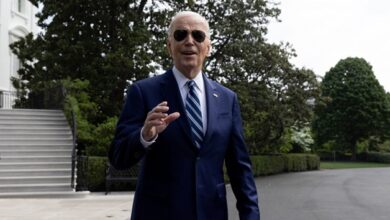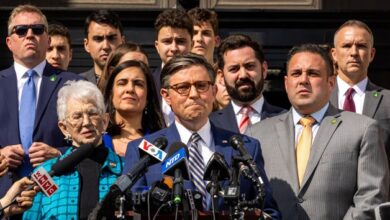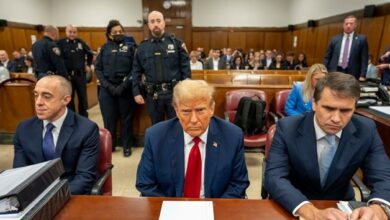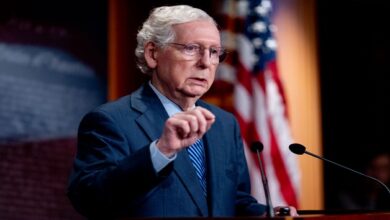Stephen Breyer insists politics don't play a role in Supreme Court's decisions
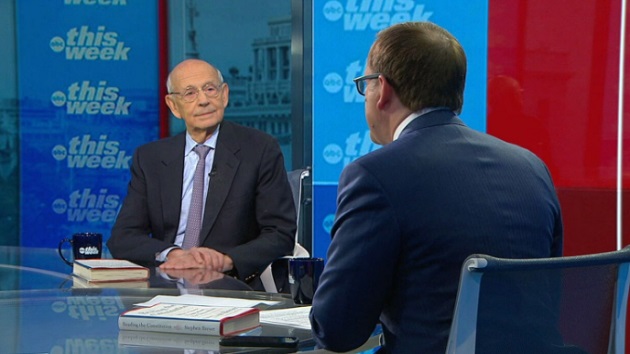
Former U.S. Supreme Court Justice Stephen Breyer is pushing back on claims that the institution has become increasingly political, reflecting the partisan divides in America at large as the high court weighs in on Donald Trump’s candidacy, abortion access and more.
“I’ve not seen politics in the court, and I’ve been a judge for 40 years,” Breyer told ABC “This Week” co-anchor Jonathan Karl in an interview that aired Sunday. “Not politics in the sense in which I understood that word when I worked for Sen. [Ted] Kennedy. … No, that isn’t there. That just isn’t there.”
Breyer, who retired in 2022, is the author of the new book “Reading the Constitution: Why I Chose Pragmatism, Not Textualism.”
Over his nearly three decades on the high court, Breyer saw its ideological balance shift more to the right and the justices now split 6-3 between conservatives and liberals.
But the judges’ decisions don’t match the ideological divides seen in the White House and in Congress, Breyer said.
Rather, the justices are driven by their interpretations of the law and Constitution, their relationships with each other — and, to some extent, an awareness of how they are seen by the public.
Appearing on “This Week,” he addressed some of the broad dynamics at the court but avoided commenting directly on its decisions, including overruling Roe v. Wade’s guarantees to national abortion access in 2022 or, earlier this year, unanimously ruling that former President Trump can remain on the 2024 ballot following challenges to his candidacy under the Constitution’s “insurrection clause.”
That case thrust the Supreme Court into the middle of a presidential election in a way that it hadn’t been for nearly a quarter of a century, since the landmark Bush v. Gore ruling settled the 2000 presidential election.
Breyer wrote in his dissent at the time that he didn’t believe the court should have taken up the matter. He said on “This Week” that dissents have real value — but that unanimous rulings, as happened in the Trump ballot challenge, carry weight, too.
“I always thought, well, it doesn’t hurt to publish these things [dissents]. It puts out another point of view. It shows people, which they would believe anyway, that not everybody’s in agreement,” he said. “But there’s also something to be said to try to keep down the extent to which you publicly reveal the disagreement.”
The Supreme Court this week will take up another Trump case with potentially vast legal and political ramifications: whether presidents have immunity from prosecution for conducting their official duties — and whether Trump’s challenges to his 2020 election loss fell within his official duties.
If the justices side with Trump, that could upend two of the four criminal cases against him, though prosecutors maintain that his alleged criminal acts should fall outside of any immunity.
He denies all wrongdoing.
On “This Week,” Breyer was firm in his view when Karl questioned whether or not the court wanted to add to the political divide within the country: “No, God of course not. But you’re looking for an easy answer when — I’m not being coy, [but I’m] saying, ‘No, there aren’t easy answers.'”
Pressed by Karl about whether the justices privately weigh strategically ruling as a bloc on some cases, like on Trump’s ballot access or the immunity question, in order to present a bipartisan consensus to the public, Breyer demurred.
He said that there are certainly delicate deliberations among the justices: “It may be that you can find a compromise in the conference or a way of approaching things in the conference that will, in fact, solve a number of problems. And that could be one of the problems.”
But he insisted there wasn’t the kind of horse-trading Karl referenced.
“[Former Justice] Sandra O’Connor used to say this: The first unwritten rule is nobody speaks twice ’til everyone speaks once. Second unwritten rule: Tomorrow is another day. You and I were the greatest of allies on case one. Case two, we’re absolutely at loggerheads,” he said.
Breyer also challenged the idea, increasingly prevalent among the conservative-leaning justices, that the courts should only focus on the text of statutes and the Constitution to determine the outcomes of cases, a legal theory known as textualism.
As he highlights in his book, Breyer believes that judges must consider other factors when interpreting laws, too, including who wrote them, why they were written, how they reflect the values of the Constitution and the practical consequences of court decisions.
“Who wrote those words and what did they have in mind? What was Congress trying to do? What are the consequences if you go one way rather than another way? How does it fit into a set of values that begins with the Constitution?” Breyer said. “Judges have always done that kind of thing.”
That ideology is directly at odds with the textualist approach highlighted in the 2022 overruling of Roe in the Dobbs v. Jackson Women’s Health Organization case.
In the majority ruling, Associate Justice Samuel Alito wrote that, “We do not pretend to know how our political system or society will respond to today’s decision overruling Roe and Casey. And even if we could foresee what will happen, we would have no authority to let that knowledge influence our decision.”
Despite acknowledging that the court’s decisions will directly impact society at large, Breyer said that factor doesn’t lead the decision-making process for justices.
“I would say that’s in your mind,” he said. “When you say — does that lead to your deciding X rather than not X? Well, I can never say never, but rarely.”
He quoted the late constitutional law professor Paul Freund.
“No judge should or will be moved by the temperature of the day, but every judge will be aware of the climate of the season.”
Copyright © 2024, ABC Audio. All rights reserved.



